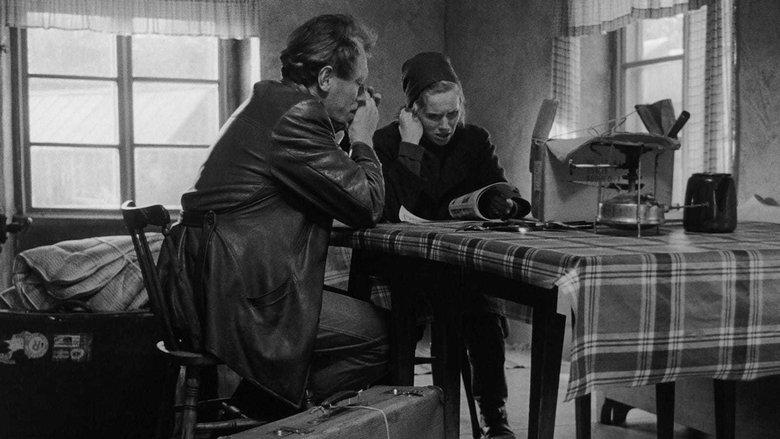

Shame (1968)
In the midst of a civil war, former violinists Jan and Eva Rosenberg, who have a tempestuous marriage, run a farm on a rural island. In spite of their best efforts to escape their homeland, the war impinges on every aspect of their lives.
Watch Trailer
Cast


Reviews
The apolitical musicians Eva (Liv Ullmann) and Jan Rosenberg (Max von Sydow) have been married for seven years and live in a small farm in a remote island to escape from a civil war in the continent. They provide lingenberry to a couple of costumers to raise some money and buy some supplies. They love each other and Eva is twenty years old and wants to have a baby but the reluctant Jan, who is a weak and sensitive man, does not want to have children. When the rebels arrive in the island, their peaceful and calm lives turn to hell, and they get in the middle of accusations from both sides. When Colonel Jacobi (Gunnar Björnstrand) stalks Eva, Jan changes his behavior and becomes a brutal man, and the love and affection they feel for each other change to hatred and indifference."Shame" is an antiwar movie by the master Ingmar Bergman focused by the eyes of a couple of artists that are apolitical and does not listen to the news, but when the war arrives to their lands, they have their love, friendship and affection destroyed by the senseless soldiers. Liv Ullmann and Max von Sydow have top-notch performances as usual and I do not recall seeing the breast of Liv Ullmann in any other movie. The process of brutalization of the pacific and sensitive Jan Rosenberg by the war is impressive and the bleak open conclusion is pessimist and adequate to the dramatic story. My vote is nine.Title (Brazil): "Vergonha" ("Shame")
This begrudging and angry film is against not just the war during which it was made, but all war. It doesn't care what war it is. It might be the most emotionally involving experience I have ever had with Ingmar Bergman's work. There are no sides to the two main characters in this impacting drama, which doesn't intimate a point in any ceremonial symbolism as per Bergman's usual, but plainly showcases people and their lives and exercises what Bergman has already proved he understands about a person's reaction to a movie.His top-drawer regulars Liv Ullmann and Max Von Sydow play an internalizing but bickering married couple who were once orchestra musicians. Now they live in a weathered farm house on an island. Part of the building frustration we grow to share with these two people fertilizes in the detail that nothing in their house seems to work. They are not reclusive intellectuals, either. They are a rather familiar marriage that has more or less resigned from life and is essentially apolitical; they only get wind of distant rumors of a war that has been going on forever. Ullmann is concerned with the danger to their lives and to her desire to bear children. Her husband Von Sydow shrugs off that the war will pass them by. Their serenity is interrupted by screaming fighter planes flying low over their house, the killing of a parachuting airman, the arrival of dubious troops, their inquisition, and eventually their capture by what appears to be the local side, but loyalties have long since splintered. They are sent back to their home, witness gratuitous destruction and suffer the vindictive consequences of such an agonizingly distrustful marriage. This, one of my top favorite Bergman efforts, is a study of a couple jarred from their safely self-unaware lives and violated by a manipulative despair, testing them both to reveal who they really are. She lacks compassion to some extent, too self-serving and restless to have any patience for his capricious breakdowns into crying. His suppressed emotional issues have led to the repression of the very initiative and excitement that attracted them to begin with. The immense last twenty minutes, sporadically interrupted by images of the overwhelming gray sky, are among the closest to real emotion that Bergman ever filmed.All systems of dogma and faith are the antagonists in this very essential and downbeat portrait. The basically clearcut personalities of Ullmann and Von Sydow's characters are hurled into the degenerate world of war because they are accused of being "sympathizers," but the film, shot on Bergman's small home island of Faro, doesn't give any information about where or when it's set, who the two sides are, and for what they're fighting. To an uninvolved civilian caught in between, the knowledge base is likely to be quite similar.Ullmann and Von Sydow are not sympathizers for the apparent enemy, but they're partisans for who are apparently their side. This 1968 reactive allegory could be about the common noncombatant citizens of Iraq, or Kosovo, or Vietnam, or Israel, or Palestine, or...
This is one of the bleakest, the most harrowing of Bergman's films I've seen. I also think this is one of the most powerful films about the ugliness of war and what it does to the human souls.The couple of musicians, who left a big city for a remote island and make a living as farmers, find themselves capable of unspeakable and shameful acts that would have ordinarily been impossible for them even imagine, as they struggle to survive horrible reality of war. They betray their souls, their friends and even each other in a desperate attempt to simply survive another day. Liv Ullmann and Max Von Sydow are brilliant as usual as lost, confused, and terrified couple that got caught in the midst of a civil war.9.5/10
This film offers one of the greatest experiences available to movie-goers. It is by no means a pleasant film, but offers realities and emotions the human mind may never have meant to touch upon. It opens pathways in how an individual thinks, and afterwards will change the person forever. The first time I saw this film was in class, and immediately after seeing it I had to skip my next class and walk around campus in order to reset my body and mind. I felt devastated and, somehow unreal, as if I didn't exist. It was only a few months later that I was telling one of my friends about SHAME, and she asked, "Oh, is that when you were messed up after seeing it, and ran into me talking all strange about it?" I didn't even remember running into or talking to anyone at all while outside that day, I was astonished. In plot terms it is the simple tale of a couple torn apart by war. There suffering is greater than that of the dead and by the end...there are no words to complete the image that Bergman creates. Its like a horrible dream which causes you to wake, altering your own reality forever. This film must be seen.




